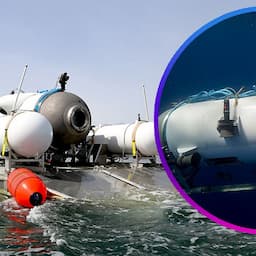ET is taking a look back at our 1997 interview with the 'Titanic' director.
James Cameron is taking ET inside the Titanic. In the wake of the Titanic tourist submersible tragedy, ET is taking a look back at its 1997 interview with the Titanic director, when he shared footage from the 12 dives he completed as part of his research for his acclaimed film.
For the passengers aboard the Titan, the submersible owned by OceanGate Expeditions, there was a "catastrophic loss of the pressure chamber" that presumably caused all aboard to die, Rear Admiral John Mauger said on Thursday.
As Cameron showed ET inside the ship, he spoke about the "freezing cold water" that the wreckage resides in and the "cramped conditions" inside the submersible he took down.
Cameron's decision to go to the Titanic's wreckage came after he priced out the options of creating a "perfect simulation of diving the Titanic and what's it going to cost to actually dive the Titanic," and found that the cost wasn't all that different.
"It seemed like you would get two sort of intangible benefits to the film," he explained. "One is you could say, 'This is real. You are there.' The other thing is, I can say to the actors, 'This is the type of film you're working on that takes its sense of veracity that importantly and I want you to do that too.'"
Essentially, "It sort of set the bar at a high level for everything to be real," Cameron said.
"It was important to me, I think, to get that sense of truth about the whole film," he noted, before admitting with a laugh, "And, let's face it, I also wanted to go see the Titanic. Once it made sense on paper, I was like, 'Yeah, let's go.'"
He and his crew did just that over the course of 12 dives, the first couple of which "were write-offs," according to Cameron.
"It was a mess down there with currents and so on and figuring out how to do things and coordinate," he said. "The first ones were rehearsal dives, really. We didn't get good footage until about the third or fourth dive."
Cameron said his dives averaged 12 hours in length, with the longest expedition lasting 17 and a half hours.
"We got about 15 minutes of runtime. So you have a 15-hour dive and 15 minutes of film. And probably from that what we use in the movie itself might be 10 seconds or 15 seconds or 20 seconds," Cameron said. "It's the gold... You don't need a lot of it."
Due to constraints about the type of camera they could get down there, none of the footage they shot during the dives appeared in the movie.
"We recreated what we saw," Cameron said. "So what you'll see in the movie is a recreation of what we saw on video, but based on the actual look of the wreckage."
Cameron said that he and the others "were just tickled" to have the experience, but said there was an overarching sadness to the trips too.
"This was sort of extracurricular," he said. "... As excited as we were, there was suddenly kind of a somberness to it, because it's like this big iron tomb down there."
"Suddenly there was a sense of wow, we should be a little more respectful here. We shouldn't treat this as much as set, but as something that we may be permitted to photograph," Cameron added. "... We became very aware of the fact that we had to move cautiously."
Cameron's dives to the wreckage ended up impacting Titanic greatly, as the experience focused him "to the emotional reality of the event, as opposed to the factual reality of the event." That reality is one Cameron spoke about at length, and one that the friends and family of those aboard the Titan -- Stockton Rush, Shahzada Dawood and his son, Suleman Dawood, Hamish Harding, and Paul-Henri "PH" Nargeolet -- are experiencing at present.
"The heartbreak of all these widows, who suddenly the next morning, the sun came up and there was nobody there, there was no ship there, there was no one saved but them," Cameron recalled thinking about while viewing the wreckage. "Their husbands were gone. When they said goodbye to them on the deck some of them knew that they might not see them again, some of them didn't. There's this tremendous kind of sadness to it."
Even so, Cameron acknowledged the intrigue surrounding the ship, telling ET, "The Titanic is the great back hole for obsession. It will just suck you in."
In an interview with ABC News on Thursday, Cameron spoke about the similarities between the Titanic and Titan tragedies, especially as it relates to safety concerns of the two vessels.
"I'm struck by the similarity of the Titanic disaster itself, where the captain was repeatedly warned about ice ahead of his ship, and yet he steamed at full speed into an ice field on a moonless night and many people died as a result," he said. "For us, it's a very similar tragedy where warnings went unheeded. To take place at the same exact site with all the diving that's going on all around the world, I think it's just astonishing. It's really quite surreal."
RELATED CONTENT:



